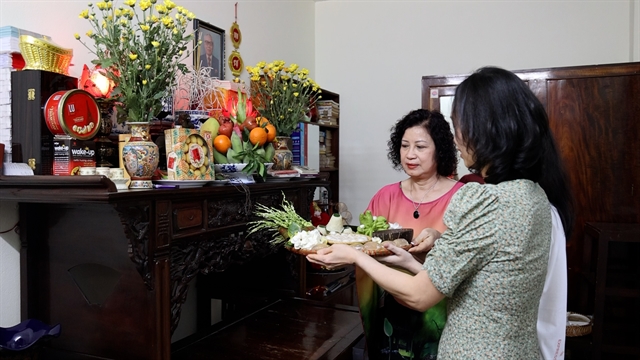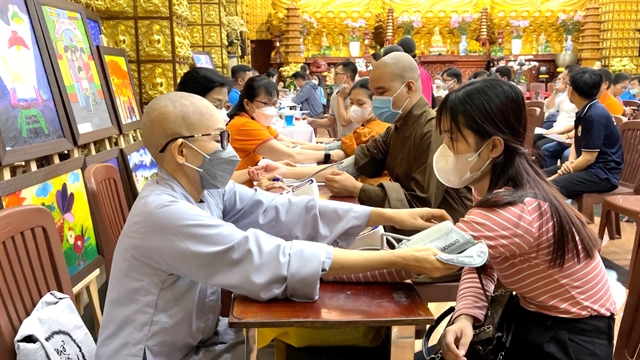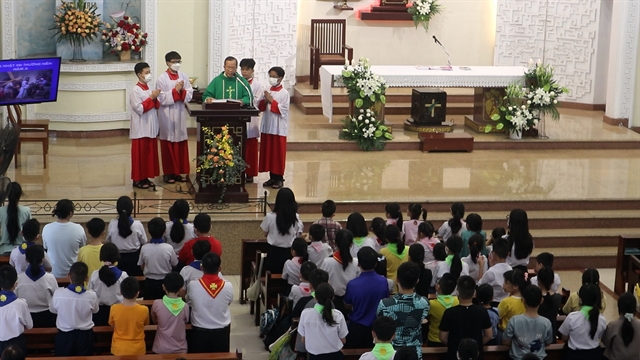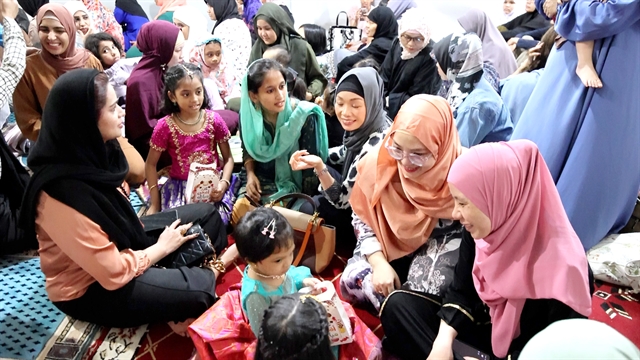Weather:
- Ha Noi 17oC
- Da Nang 21oC
- Ho Chi Minh 29oC
By Lê Hương *
Việt Nam, with a population of nearly 100 million, embraces a diverse culture with 54 ethnic groups, who have various beliefs and religions.
A book published by the Institute for Religious Studies (IRS) defines that there are 16 religions recognised in the country including Buddhism, Catholics, Protestantism, Muslim, Cao Đài, and Hoà Hảo Buddhism.
But despite not following any specific religion, most of Vietnamese people instead honour and respect their ancestors and worship those family members who have passed.
In every home, you’ll find at least one altar dedicated to their ancestors despite the religion that the house owners follow.
“There is no official statistics, but I can say over 90 per cent of Vietnamese population worship their ancestors, which has existed for a long time,” Chu Văn Tuấn Director of the IRS told Việt Nam News. “This has always been the most popular religion here."

Tuấn further said this religion has various levels: inside the nuclear family (worship grandparents, and ancestors); in the whole family (worship the ancestor of the extended family; each family group has a common worship house, where the head of the family group will maintain worshipping practice); at national level (Hùng Kings Commemoration Day), popular among 80 per cent of the population, all Kinh majority group).
“This can be considered a cultural tradition, a kind of folk belief and a kind of religion,” he added.
Based on important factors of a religion proposed by E. Durkheim, a French sociologist, worshipping ancestors should be considered a religion with a belief, object to worship, regulations in the belief and a community to follow the belief.
“If we take the approach that considers ancestors worshipping is a religion, Việt Nam is a country with most of people have belief in a religion,” Tuấn said.
“Worshipping ancestors surely affect other religions, especially domestic religions. Yet this is not a root for other religions as there are many religions imported from overseas.”
Hanoian Nguyễn Văn Huy believes there is a holy world existing and his ancestors accompany their offspring to protect them.
That, he feels, is why it is important to honour those before you at home altars.
“There are certain regulations,” Huy said. “For example, an altar should be placed high in the most formal area in the house, people burn incense and put offerings on the altar on death anniversaries, the first and the 15th days of the lunar month, and read certain praying messages and no one should have his/her back towards the altar.”
Free in mind
All recognised religions are free to carry out their activities here.
Buddhism is the religion with the most followers in Việt Nam today and in its thousand-year history.
Venerable monk Thích Nhật Từ, from the Việt Nam Buddhist Sangha said: “The first reason is that a key principle that Buddha taught his followers is that they should have deep gratitude for the motherland, and always protect the country, especially in resistant wars against invaders.
"Buddhism has come along with the country in three fields, strongest in the field of culture.”

He said Buddhism has developed Vietnamese culture, and Vietnamese culture has also learned from Buddhism. Many cultural rituals and festivals have been affected from Buddhism’s life philosophy.
He added: “At present, the Việt Nam Buddhist Sangha aims to promote Vietnamese culture through its costumes, cuisine, fine arts and architecture, pure Vietnamese language and other cultural angles in an attempt to increase Việt Nam's GDP and make the country among high-income countries in the next few decades.
"Preserving ethnic identity is a leading concern to the Việt Nam Buddhist Sangha.”
Buddhism has a guideline that monks can take off religious robes to wear soldiers’ uniforms. It means, during the wars, monks should sacrifice their religious time in making small contributions to bring along the country’s holy sovereignty.
When peace comes, they can return to their religious lives, he said.
Venerable monk Thích Thanh Huân, also from the Việt Nam Buddhist Sangha, said that religious activities by people and pagodas are fully supported by the whole community, especially by local authorities.
“The authorities support us in various forms like ensuring security or calling the community with the pagoda to join in humane, charity and spreading Buddhist teachings activities," he said.
Huân said charity activities are based on Buddha’s teachings: avoid evils, do good work, and keep a clean and peaceful soul.
“Charity works aim to make the soul more beautiful, heal spiritual disease and diseases stemming from material matter,” he added.
Đặng Thị Oanh, a Buddhist, said she often visits pagodas where many orphaned children are raised.
“I feel very happy to see them,” she said.
“I consider them my children. Many children were abandoned at a very small age. They are very friendly. Though we are strangers, they hug me, ask me to take them in my arms, call me ‘mum’. I am very happy and moved. I love them a lot.”
Oanh said she feels peaceful and relaxed when visiting a pagoda.
Although they do have their own individual beliefs, religious organisations in Việt Nam share one common feature - the act of kindness and helping those in need.

According to Priest Phero Vũ Minh Hùng in Vườn Xoài Diocese, District 3, HCM City, at Catholic ceremonies or national holidays, they have programme for needy people. They distribute rice to poor people every few months to share their difficulties. Catholics also collect old clothes and unwanted utensils to give to the poor in remote areas.
“Catholicism lives with people so people should not have belief only, they should act,” he said.
“The belief guides people to serve one another, and love one another. We, the Catholics and the Church always do charity work to support other needy people. That’s the mission of Catholicism.”
Priest Hùng said that all over Việt Nam, authorities and people respect religions.
“Buddhism or Catholicism, followers can practise their beliefs as usual and the State recognised them,” he added.
“So there’s no restriction.”
Followers feel at ease when practising the religion.
Catholic Phan Vũ Lê in Vườn Xoài Diocese said she had moved from Buddhism to Catholicism over five years ago.
“In my life, if I have any sorrows or situations that I don’t know how to behave, I tell God and Mother Maria,” she said.
“Then I will find it’s easy to overcome obstacles. I feel the God helps me and changes me.”
Holy place
Al Noor mosque has been the only Muslim mosque in the north, where Muslims gather to pray every day.
Đoàn Hồng Cương, a Pakistani Vietnamese who has visited the mosque for the past 40 years, said there are some 300 Muslim people in Hà Nội including diplomatic officials and several hundreds of Muslims in the north.
“Before, this mosque was very spacious. Now the number of Muslims has increased a lot and this mosque has turned to be very small,” he said. “We are dealing with paper procedures to ask for the Red Book granted for this land again. All documents of the mosque were destroyed during the war. Then the community will contribute money to rebuild it, to build one more storey as the mosque is too crowded now.”
A frequent visitor to the mosque, Ahmad Jais Bi Tasliman, an official from the Malaysian Embassy, added: “We are very happy to stay in Việt Nam because the Government allows us to practise the Muslim religion and do Muslim celebration activities.

Vũ Khánh Chi, a Vietnamese Muslim, said the Muslim community often does charity work inside the community to help needy people by donating objects or cash.
“In general, religion will not have right or wrong,” she added.
“It can be suitable to one person and not suitable to another person. Islam religion is one permitted religion in Việt Nam. When people share the same religion community, people pray here and share stories. We try to do good, practise our faith and support the community.
“‘Islam’, in Arabic language means ‘peace’. When I come here to pray, I find my soul more peaceful, and my pressures released. I have a community to share and a belief to follow.”
According to scholar Tuấn, religion has played an important role in various fields of society.
“Making contributions to society is a function of religion, through which it can enhance its role for the common good,” he stressed.
“The State and the Party have coined religion’s support a huge power source for social development.” VNS
*Additional reporting by Nhật Hồng, Việt Dũng & Xuân Đăng


